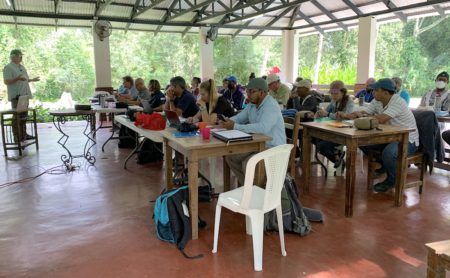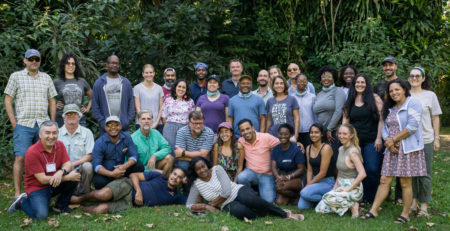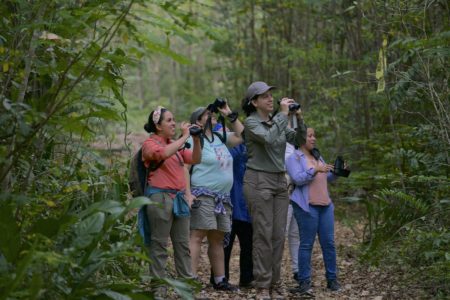2022 was a year of new beginnings. With the COVID era mostly behind us, we focused on moving forward, with a host of activities and projects under way. It was hectic!
Puerto Rico vibes!
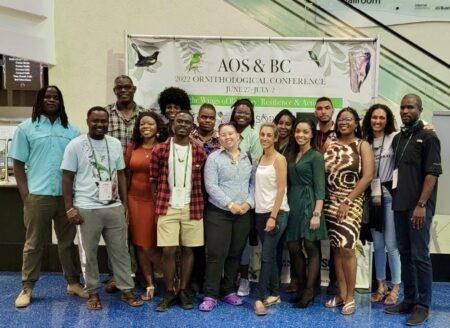
Our 23rd International Conference in Puerto Rico – co-hosted with the American Ornithological Society (AOS) for the first time – in partnership with Para la Naturaleza, and Sociedad Ornitológica Puertorriqueña, was a reflection of our upbeat approach. The theme was “On the Wings of Recovery: Resilience and Action,” and the event was packed with symposia, roundtables, workshops, working group meetings…and of course, networking! Over 800 conservation professionals from 34 countries gathered for the conference, from June 27-July 2, 2022. This meeting was much larger than usual, but we didn’t get lost! There were many opportunities to make new friends and expand our horizons for research, collaboration and information-sharing in hundreds of different ways.
Launched: the Caribbean Landbird Monitoring Network
The Puerto Rico conference included a Caribbean Landbird Monitoring Training Workshop, as part of our ongoing efforts to build a regional network that will employ standardized methods to monitor and protect our landbirds. In February, we brought wildlife professionals from 16 countries to the Dominican Republic for our first Caribbean Landbird Monitoring Training Workshop. With 26 enthusiastic participants, this was a refreshing occasion to “reconnect” in person with old friends. The workshop also introduced the Programa de América Latina para las Aves Silvestres (PROALAS) bird survey protocols, as well as the eBird Caribbean database, to those who were not familiar with it. We will be heading to St. Vincent for another Landbird Monitoring Training Workshop from January 23 – 27. We are grateful to the US Fish and Wildlife Service, the Critical Ecosystem Partnership Fund, the US Forest Service (International Program) and many others for funding and support to develop our Landbird Monitoring Program.
Listening out for the Whistling Warbler
This year, we will be continuing our work to monitor and assess the status of St. Vincent’s charming, endemic and endangered Whistling Warbler (the “Oreo Bird”). A team from Antioch University joined BirdsCaribbean and the St. Vincent and the Grenadines Department of Forestry to determine the impact of the island’s volcanic eruption of April, 2021. Find out what the group learned about the status of this bird here.
We’re on a learning curve!
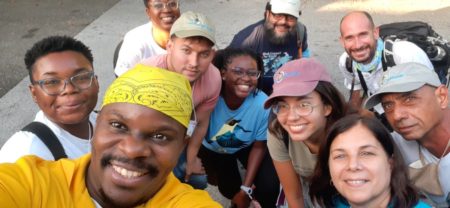
These workshops formed part of our renewed thrust towards capacity building in the islands of the Caribbean. We plan to continue training, educating and engaging with students, ornithologists, conservationists, and non-governmental organizations to enhance the skills and increase the knowledge base of our bird conservationists of the future. Last year, we provided skills training, mentoring and materials to over 175 Caribbean wildlife professionals from more than 21 islands! If you would like to support us in our efforts, we would greatly appreciate it!!
Here are some highlights:
In September we hosted a two-day Wetlands Education Training Workshop in Walkers Reserve, Barbados, where participants not only learned about wetland birds but also the importance of protecting this significant habitat. We are grateful for funding from Environment and Climate Change Canada for this program.
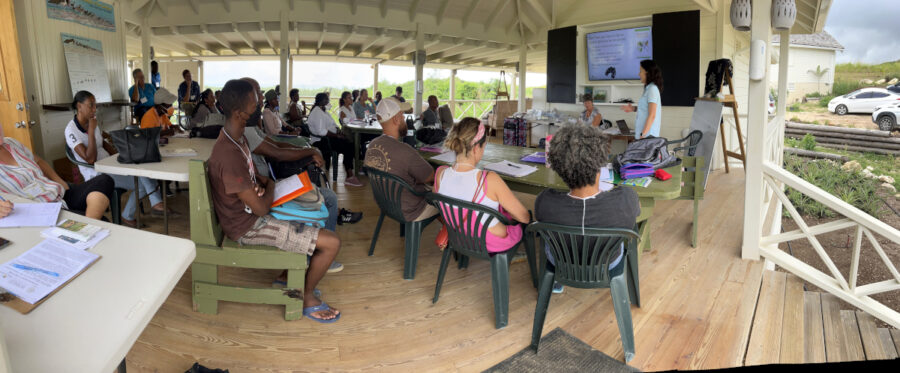
In March, we had another “first:” a Caribbean Bird Banding Training Workshop held in Nassau, Bahamas. After the banding training we were able to support three Caribbean conservationists as banding interns, Shanna Challenger, Zoya Buckmire and Chris Johnson. Chris did his Bird Banding Internship in the glorious Rocky Mountains of Wyoming, USA! Supported by Audubon Rockies.
Following our session in Nassau, we were thrilled to announce that the Caribbean Bird Banding Network now has its very own North American Banding Council (NABC) certified banding trainer, Juan Carlos Fernandez. In addition, three Caribbean nationals passed the rigorous exam and were certified as banders in 2022. It’s important for our young Caribbean conservationists to have a certificate in their hand. We are so proud of our trainees, and feel sure they will inspire others. Learning is sharing!
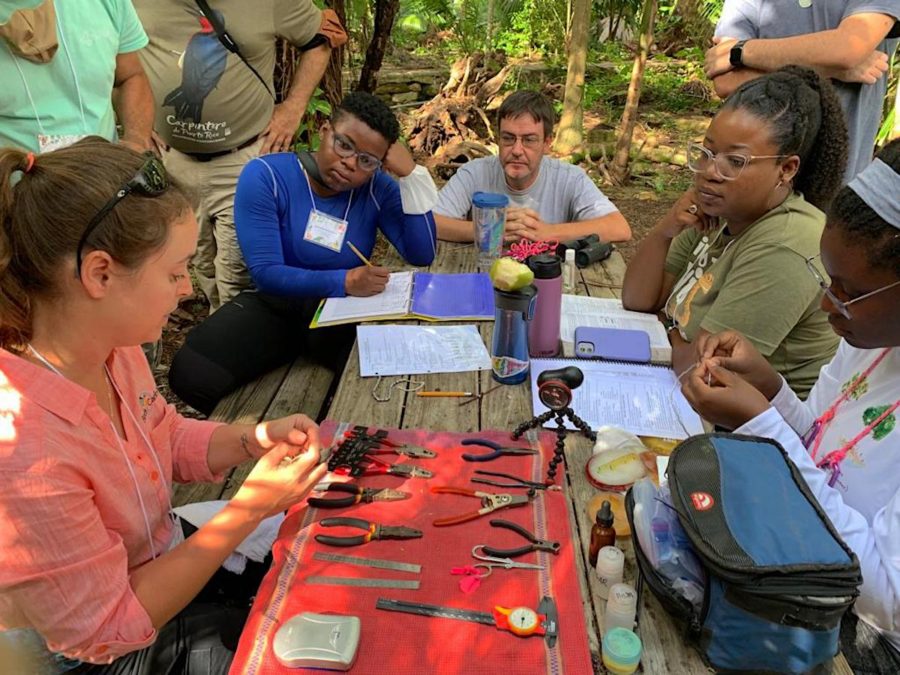
Motus is moving…
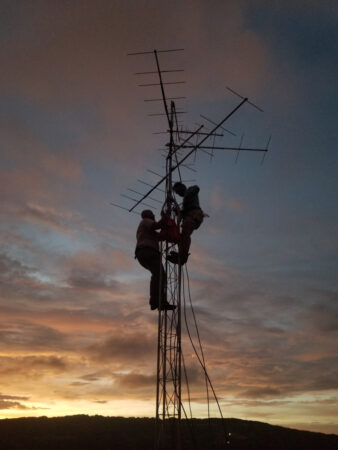
One of the most exciting developments of 2022 is the Caribbean Motus Collaboration, now under way. This dynamic monitoring research network was developed by Birds Canada, using automated radio telemetry to track flying creatures with nano-tags (including birds). The system already includes hundreds of receivers and thousands of tags, across the United States and Canada and more recently in Central and South America. The Caribbean cannot be left out, as it is more critical than ever to track our migrating birds, their flyways and stopover sites.
So, we kick-started our Motus network with the installation of two towers in Puerto Rico in March. It was an amazing learning process for twelve trainees, supervised by experts from our supportive partners, the Northeast Motus Collaboration (NMC). As part of our Caribbean Landbird Monitoring Network, this is yet another skill that our Caribbean trainees have been working on – and this should develop into a “train the trainers” opportunity across the islands.
On to Barbados, where our trainee needed a good head for heights to learn how to install another Motus tower at Walkers Reserve, a former sand quarry now transformed into new wetlands.
We are keeping up the momentum! You should see more Motus towers going up in the next year or so in The Bahamas, Dominican Republic, Jamaica, the Cayman Islands, Saba, and several other islands. And birds are already being tracked by the new towers!
Expressing love for Caribbean birds…
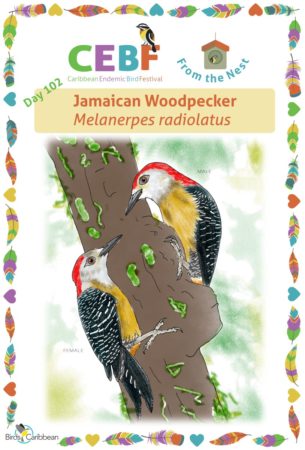 The theme of our Caribbean Endemic Bird Festival (April 22 to May 22, 2022) was “Loving Birds Is Human Nature.” Well, isn’t that true? It inspired all kinds of creativity through our first ever poetry competition and a short story competition. The eloquent and passionately expressed entries, in English and Spanish, were compiled in a beautiful online anthology. Also online, we continued our “From the Nest” series with a focus on Caribbean endemic birds, providing all kinds of information on the very special birds that make up almost one third of the total number of species found in our region.
The theme of our Caribbean Endemic Bird Festival (April 22 to May 22, 2022) was “Loving Birds Is Human Nature.” Well, isn’t that true? It inspired all kinds of creativity through our first ever poetry competition and a short story competition. The eloquent and passionately expressed entries, in English and Spanish, were compiled in a beautiful online anthology. Also online, we continued our “From the Nest” series with a focus on Caribbean endemic birds, providing all kinds of information on the very special birds that make up almost one third of the total number of species found in our region.
The World Migratory Bird Day theme this fall was “Dim the Lights for Birds At Night.” Activities across the islands included talks on this subject (light pollution is a growing problem for migratory birds, even in the Caribbean), bird walks, and more. The 2023 theme is already revealed, and it is simply “Water” – that essential for all forms of life!
Global Big Day got bigger (again)
Global Big Day (Saturday, May 14) was nothing short of spectacular for the Caribbean. The numbers literally soared, as observers spotted 473 species, with Cuba coming out on top with 166. Record numbers of observers and checklists were posted on eBird Caribbean. Puerto Rico, Cuba, and Jamaica all saw over 80% of their endemic species. As in past years, BirdsCaribbean’s fifteen teams were in hot competition, while raising funds for Caribbean travel to the AOS-BC conference in Puerto rRicao. We are looking forward to more records being smashed in 2023!
… And Speaking up for Caribbean birds
Phew! What a year – and there is much more to come. On a more sober note: we know that many of our birds are in decline. In fact, about one quarter of the species that live in the Caribbean and nowhere else are in trouble. Additionally, a number of the migratory species that visit our region annually are facing challenges. These include development (housing and coastal tourism), pollution, unsustainable agricultural practices, wildlife trafficking, and a range of impacts from climate change, including extreme weather events, sea level rise, and higher temperatures. BirdsCaribbean will continue to be a champion for our birds. You will hear our voice as we seek greater protection for them.

Despite all the concerns, thanks to our amazing Giving Tuesday and year-end fundraising efforts, we continue to move ahead in a spirit of optimism. We are enormously grateful to all our donors and supporters. Stay tuned for more exciting news – and ways in which you can get involved – in the very near future!

